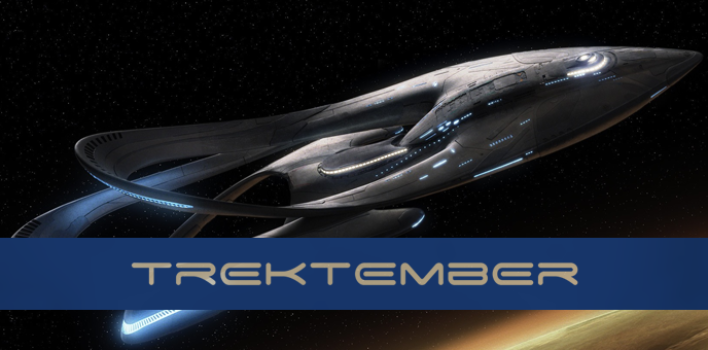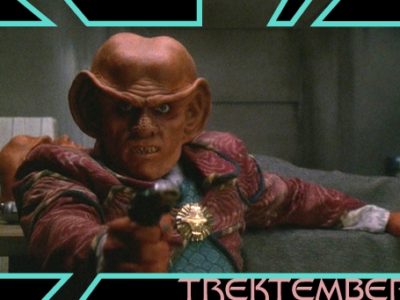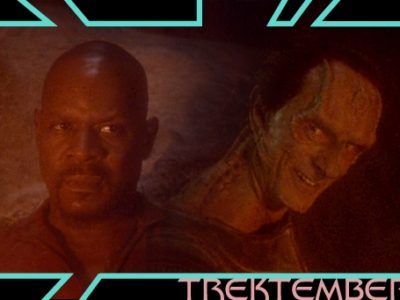Trektember: “The Orville” Preview
Why The Orville is Even More Like Star Trek Than You Think
It doesn’t take an android with a positronic brain to understand why Seth MacFarlane’s comedic sci-fi series The Orville is a lot like Star Trek. It’s a show about a diverse crew on an exploratory mission through space to seek out new worlds and new civilizations. Which show did I just describe? Yes. And with visual similarities like color-coded uniforms, warp-like engines, and even a holodeck, you wouldn’t be faulted for thinking The Orville is an outright rip off. But while it basically is, it also isn’t. All in all, it’s a great homage that brings Trek’s best and most important attributes to new audiences.
For a Trekkie like me, all the many similarities delight me to my inner warp core. While the recently launched series Star Trek: Discovery attempts to traverse new storytelling ground inside the Trek universe, The Orville is content with being a retread. That is to its credit. Where other sci-fi series have, in the past, reluctantly mirrored the Trek formula to capitalize on its success, The Orville gleefully rejoices in it like a Ferengi who just won his weight in gold-pressed latinum. Simply put, it has a blast and invites its audience to do the same.
But is The Orville truly comparable in quality to a five-decade spanning, trailblazing science fiction franchise? Certainly, there is a grand, cinematic reverence present in every Star Trek series. The infinite expanse of space, the aura of new lifeforms, and the ever-fickle human condition are most often explored with sweeping wonderment. The Orville lacks some of that trademark grandeur, but it does add its own potent ingredient to the Trek recipe: humor. For some, it may be easy to write off the show for the lowbrow nature of some (okay, most) of its comedy, but I believe it to be the very thing that makes this show great Trek.
Gene Roddenberry, the man responsible for bringing us to the final frontier, was quoted as saying about his creation that, “Star Trek was an attempt to say that humanity will reach maturity and wisdom on the day that it begins not just to tolerate but take a special delight in differences in ideas and differences in life forms.” And what an attempt it was. I mean, the original series portrayed the first interracial kiss on television in the early 1960s. Boldly go, it did.
The Orville certainly isn’t breaking new ground by any means, but the funny bone that reverberates throughout each episode helps us see our most eccentric ideas and differences in a communal light. Its humor is often self-enhancing, not self-defeating. It is a tool to illustrate, just as Trek did with drama, that even if our skin has scales, or we’re composed of a cybernetic framework, or if we’re a gelatinous blob capable of taking on many forms, we’re all worthy of respect. The Vulcans would call this Infinite Diversity in Infinite Combinations. The crew of the Orville would have a chuckle about it.
This also brings a grounded honesty to characters that could quickly become caricatures after fifty years of retread formula. It allows the show to tackle some hot button issues in the spirit of Trek, without feeling cheap or outdated. The humor brings levity as it illuminates, which is something MacFarlane is a master of. It knows that you know what it’s doing, but it still has some things to say.
And one can’t talk MacFarlane without talking his love of Star Trek: The Next Generation, which he parallels heavily here. A robotic crewman trying to understand humanity, a promiscuous first officer, a strong head of security with ridges on her face, and a female doctor – they’re all on the bridge of the Orville. MacFarlane even brought in Brannon Braga, writer/ producer on Next Gen, Deep Space Nine and Voyager, as producer. Commander Riker himself, Jonathan Frakes, even directed an episode. The resemblances are many, but there is also a great deal more the show has to offer.
The Orville is a series that beats with the heart of Gene Roddenberry. Where science fiction often seems quick to tread into hopeless, dystopian visions of the future, that bright Roddenberry spirit of utopic possibility always trekked the other way, for better or worse. The formula he perfected is rooted deep within this comedic tale of a ship and crew in space. The Orville still takes the time to wrestle with necessary questions, it just likes to do it with a smile on its face. I think it proudly continues the mission, even though the voyage looks a little different.
• • •
Trektember is an annual series about Star Trek; this year, we’re examining the first seasons of Star Trek: Discovery and The Orville. For more information on this series, click here; or, to read every article from the beginning, click here!









Pingback: Trektember: Season 3 Episode List | Reel World Theology
Pingback: Trektember: About a Girl | The Orville | Reel World Theology
Pingback: Trektember: New Dimensions | The Orville | Reel World Theology